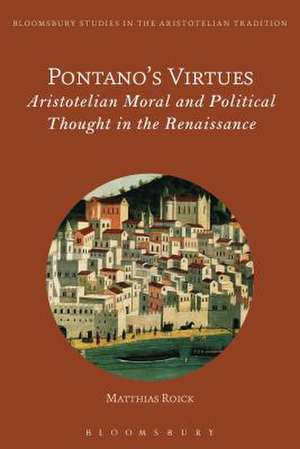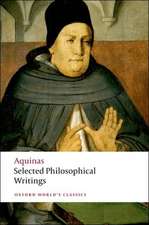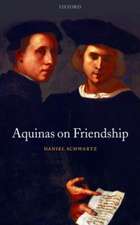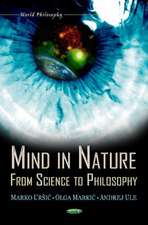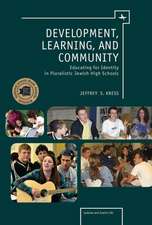Pontano’s Virtues: Aristotelian Moral and Political Thought in the Renaissance: Bloomsbury Studies in the Aristotelian Tradition
Autor Matthias Roicken Limba Engleză Paperback – 22 aug 2018
| Toate formatele și edițiile | Preț | Express |
|---|---|---|
| Paperback (1) | 239.85 lei 6-8 săpt. | |
| Bloomsbury Publishing – 22 aug 2018 | 239.85 lei 6-8 săpt. | |
| Hardback (1) | 776.24 lei 6-8 săpt. | |
| Bloomsbury Publishing – 22 feb 2017 | 776.24 lei 6-8 săpt. |
Din seria Bloomsbury Studies in the Aristotelian Tradition
- 20%
 Preț: 219.57 lei
Preț: 219.57 lei -
 Preț: 193.36 lei
Preț: 193.36 lei - 23%
 Preț: 191.22 lei
Preț: 191.22 lei - 23%
 Preț: 191.31 lei
Preț: 191.31 lei - 14%
 Preț: 512.22 lei
Preț: 512.22 lei - 30%
 Preț: 511.48 lei
Preț: 511.48 lei - 22%
 Preț: 236.45 lei
Preț: 236.45 lei - 22%
 Preț: 230.51 lei
Preț: 230.51 lei - 13%
 Preț: 222.55 lei
Preț: 222.55 lei - 21%
 Preț: 216.99 lei
Preț: 216.99 lei - 23%
 Preț: 199.10 lei
Preț: 199.10 lei - 23%
 Preț: 198.12 lei
Preț: 198.12 lei - 23%
 Preț: 198.57 lei
Preț: 198.57 lei - 30%
 Preț: 510.42 lei
Preț: 510.42 lei - 30%
 Preț: 510.49 lei
Preț: 510.49 lei - 30%
 Preț: 511.14 lei
Preț: 511.14 lei - 30%
 Preț: 511.48 lei
Preț: 511.48 lei -
 Preț: 250.59 lei
Preț: 250.59 lei
Preț: 239.85 lei
Preț vechi: 306.84 lei
-22% Nou
Puncte Express: 360
Preț estimativ în valută:
45.89€ • 47.92$ • 37.90£
45.89€ • 47.92$ • 37.90£
Carte tipărită la comandă
Livrare economică 15-29 aprilie
Preluare comenzi: 021 569.72.76
Specificații
ISBN-13: 9781350082175
ISBN-10: 1350082171
Pagini: 336
Dimensiuni: 156 x 234 mm
Greutate: 0.47 kg
Ediția:NIPPOD
Editura: Bloomsbury Publishing
Colecția Bloomsbury Academic
Seria Bloomsbury Studies in the Aristotelian Tradition
Locul publicării:London, United Kingdom
ISBN-10: 1350082171
Pagini: 336
Dimensiuni: 156 x 234 mm
Greutate: 0.47 kg
Ediția:NIPPOD
Editura: Bloomsbury Publishing
Colecția Bloomsbury Academic
Seria Bloomsbury Studies in the Aristotelian Tradition
Locul publicării:London, United Kingdom
Caracteristici
Detailed discussion and insight into Aristotelian virtue ethics in the early modern period, in contrast to a widespread tendency to dismiss virtue and to discuss new approaches in the moral philosophy of the time
Notă biografică
Matthias Roick is Freigeist Fellow for the History of Ethics, University of Göttingen, Germany.
Cuprins
IntroductionPart I: The 'Great Pontano'1. The Storms of Life2. The Haven of PhilosophyPart II: Rewriting Moral Philosophy3. Learned Authority4. Latin PhilosophyPart III: The Secrets of Virtue5. The Rule of Reason6. Beyond the VeilConclusionAppendix 1: Chronology of Pontano's WorksAppendix 2: Chronology pf Pontano's Life and Political EventsAppendix 3: Moral Virtues in Aristotle and PontanoNotesBibliographyIndex
Recenzii
This is a brilliant study of one of the most versatile minds that the humanist culture of Renaissance Italy has produced. Written in a superb style, Roick presents, for the first time, a comprehensive interpretation of Pontano as a political actor, diplomat, and philosopher, whose work can be seen as a creative rewriting of Aristotelian virtue ethics. To understand the world of Pontano, Roick has crossed different fields of inquiry including philosophy, history, literature, poetry, and astrology, and his book is an excellent guide through this neglected but important territory of intellectual history. It is thereby not only the first book on Pontano as a thinker in his own right. It also makes a convincing case for the inclusion of Renaissance humanism in the study of moral and political philosophy in early-modern Europe.
The subject of this interesting and innovative study by Matthias Roick is the moral and political thought of the prolific Neapolitan diplomat and humanist, Giovanni Pontano (1426-1503). It is based on the range of Pontano's various treatises and tracts, as well as on his better known dialogues and poems; and it approaches his thought not only in terms of individual doctrines and theses, but, more comprehensively, in terms of its re-envisioning of Aristotelian moral and political thought "in a humanist key." Centered as it is on the complex notion of virtue, Pontano's Aristotelianism emerges not just as an academic or "strained" Aristotelianism, but rather as a powerful guide to knowledge and to human action in the turbulent world of fifteenth century Italian politics.
As it follows the theme of virtue throughout Giovanni Pontano's philosophical production, Roick's book is an important contribution to current scholarship on Early Modern Aristotelianism, as well as an exemplary work in intellectual history. In Roick's hands, the "great Pontano", his relationship with Aristotle and Medieval scholasticism, his role in the Aragonese Kindgom of Naples and the history of Quattrocento Italy are not merely erudite topics, but parts of a thoughtful reflection on how historical contexts shape philosophical ideas as well as our own way to look at Renaissance culture.
The subject of this interesting and innovative study by Matthias Roick is the moral and political thought of the prolific Neapolitan diplomat and humanist, Giovanni Pontano (1426-1503). It is based on the range of Pontano's various treatises and tracts, as well as on his better known dialogues and poems; and it approaches his thought not only in terms of individual doctrines and theses, but, more comprehensively, in terms of its re-envisioning of Aristotelian moral and political thought "in a humanist key." Centered as it is on the complex notion of virtue, Pontano's Aristotelianism emerges not just as an academic or "strained" Aristotelianism, but rather as a powerful guide to knowledge and to human action in the turbulent world of fifteenth century Italian politics.
As it follows the theme of virtue throughout Giovanni Pontano's philosophical production, Roick's book is an important contribution to current scholarship on Early Modern Aristotelianism, as well as an exemplary work in intellectual history. In Roick's hands, the "great Pontano", his relationship with Aristotle and Medieval scholasticism, his role in the Aragonese Kindgom of Naples and the history of Quattrocento Italy are not merely erudite topics, but parts of a thoughtful reflection on how historical contexts shape philosophical ideas as well as our own way to look at Renaissance culture.
